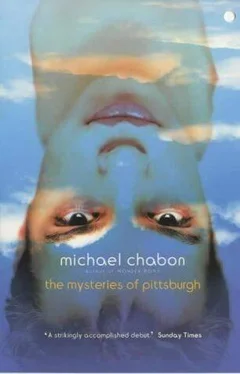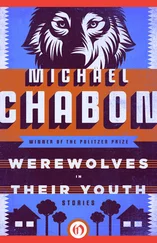Michael Chabon - The Mysteries Of Pittsburgh
Здесь есть возможность читать онлайн «Michael Chabon - The Mysteries Of Pittsburgh» весь текст электронной книги совершенно бесплатно (целиком полную версию без сокращений). В некоторых случаях можно слушать аудио, скачать через торрент в формате fb2 и присутствует краткое содержание. Жанр: Современная проза, на английском языке. Описание произведения, (предисловие) а так же отзывы посетителей доступны на портале библиотеки ЛибКат.
- Название:The Mysteries Of Pittsburgh
- Автор:
- Жанр:
- Год:неизвестен
- ISBN:нет данных
- Рейтинг книги:5 / 5. Голосов: 1
-
Избранное:Добавить в избранное
- Отзывы:
-
Ваша оценка:
- 100
- 1
- 2
- 3
- 4
- 5
The Mysteries Of Pittsburgh: краткое содержание, описание и аннотация
Предлагаем к чтению аннотацию, описание, краткое содержание или предисловие (зависит от того, что написал сам автор книги «The Mysteries Of Pittsburgh»). Если вы не нашли необходимую информацию о книге — напишите в комментариях, мы постараемся отыскать её.
The Mysteries Of Pittsburgh — читать онлайн бесплатно полную книгу (весь текст) целиком
Ниже представлен текст книги, разбитый по страницам. Система сохранения места последней прочитанной страницы, позволяет с удобством читать онлайн бесплатно книгу «The Mysteries Of Pittsburgh», без необходимости каждый раз заново искать на чём Вы остановились. Поставьте закладку, и сможете в любой момент перейти на страницу, на которой закончили чтение.
Интервал:
Закладка:
"Yeah. Say, isn't it too early for this discussion? Couldn't we save it for such time as I am drunk enough to ignore it and fall asleep mid-reply? That reminds me," he said, and without slowing he swerved the car off the small state highway and we stopped in the deserted parking lot of a grocery store, where Cleveland got out and went around to the trunk.
"What's in the trunk?" I asked Arthur, who yawned, stretched, and turned to face me, looking pink and unshaven.
"Oblivion," he said. "Oblivion is in the trunk."
Cleveland climbed back in with a six-pack from the cooler, and by the time we reached the house on the lake, he was well into his second green aluminum fist of Rolling Rock, and though his driving hadn't really fallen apart yet, I was glad we weren't going any farther. The road grew narrow and crooked, the trees grew denser, and to our left I began to make out, through rare gaps in the pine and sycamore, strips of silver lake, and the striped awnings of distant houses; soon we came to a gravel drive, to a cluster of rusted mailboxes like a row of tumbledown tenements, their red metal flags hoisted and falling at all angles. As we pulled, gravel popping, into the driveway, Cleveland stopped the car, threw it into park, and got out.
"I'm going to walk, " he said. He slammed the door and set off, carrying a can of beer. Arthur and I sat a moment, watching him shamble toward the empty house, something determined yet wary in his tread. The engine began laboriously to idle. Three or four minutes passed. Arthur put his feet up on the dashboard.
"Well?" I said.
"He always does this," said Arthur. "He'll be back."
"You mean we just sit here and wait?"
"Can you drive?"
"Can't you?" I scrambled over the seatback and settled in behind the steering wheel, which was warm in just two places, as though from the heat of Cleveland 's hands. "You really are a relic," I said.
"There have always been people willing to do my driving for me," he said, shrugging, as I put the car in gear. "People like you."
Although Cleveland had said that his father visited it every other weekend, the summer house looked long abandoned. It was white wood, trimmed in blue, with a veranda that ran all the way around and a white rowboat rotting on its wild front lawn; this lawn, weedy and filled with gnats, began at the edge of the lakefront beach, surrounded the house, and then ended abruptly in a sagging, vine-covered slat fence at the treeline, as though it could barely withstand the encroachments of the forest around it-indeed, here and there amid the weeds, packs of saplings and even young trees were closing in. One of the front steps had come unnailed, the paint peeled from the white columns of the veranda, the bench of a broken porch glider dangled by a single chain under the wide front window, and standing on the threshold, I felt keenly aware of all the vacations that had been passed here over the last half century, all the ghostly cries of "A hummingbird!" "A meteor!" all the bitter sighs and campfires of a dozen vanished families.
When I came into the dark, cedar-smelling house, Cleveland was standing in the living room with his back to me, looking at a photograph framed over the fireplace. I came up behind him and looked. It was a picture of himself at the age of fifteen or sixteen, an angelic smirk on his face, eyes bright, hair long and of a lighter color; already he held a can of Rolling Rock in one hand, a cigarette in the other, but there was something different in this characteristic pose, something enthusiastic, gloating; and the smirk was that of a novice who had only just learned the Secret and couldn't quite believe that it was so simple. In the picture he looked handsome and nearly famous, and looking at him now, big and scarred and immobile, I saw, for the first time, what Arthur and Jane must have seen when they looked at Cleveland: diminution in growth, loss through increase, a star that has passed from yellow to red. Perhaps I read too much into this photograph, but Cleveland 's reaction to it soon confirmed my own feeling. I couldn't help but say, "Gee, Cleveland, you look really terrific in this photo."
"Yes," he said. "I was happy."
"Was it summertime?"
"Uh huh. Here at the lake."
"Doesn't summertime always make you feel kind of the way you look in this picture, though?"
"Sure," he said, but I could tell he said it only to humor me, and his tone more honestly said: Not anymore; no. He tapped the glass of the frame once with his finger, and then turned toward me.
"Let me show you your bedroom," he said, avoiding my gaze. He started off, then turned back toward the photograph and tapped it once again.
My bedroom was the back porch, which, when the tide was in, overhung Lake Erie. I changed slowly into my swimming trunks and then, stiff from the long ride in the car, ran down to the beach, where I found Arthur and Cleveland already stretched out on towels and laughing, their cans of beer little bunkers half-buried in the sand. There was a light breeze off the water, and they had kept their shirts on; Arthur's said last call. We drank, we swam, we lay on the dingy sand and looked out at the boats on the lake. Cleveland disappeared into the house for a while, and returned with an air rifle and a trash bag full of tin cans. I stayed on my towel and watched as he erected a row of targets along the fence, took aim, and blew them off without a miss.
"How can he do that when he's drunk?" I asked Arthur.
"He isn't drunk," said Arthur. "He's never drunk. He just drinks and drinks and drinks until he passes out, but he never gets drunk."
This reminded me of the photograph on the mantel, the can of beer.
"What kinds of things did he used to write?"
"Oh, essays, I guess you'd call them, odd essays. I told you about the one on cockroaches. We had this teacher in high school, a terrific woman. He started writing because of her."
"And," I said.
"And later she met with, of course, some kind of disaster."
"Which kind?"
"Death." He rolled over and faced away from me, so that I could see only the back of his head and hear his voice only in an unsatisfactory and into-the-wind way. "So, theoretically, that's why he stopped. But that's just his same old Cleveland bullshit. Every one of his failings has a perfectly good excuse. Usually some kind of disaster."
"Like?"
"Like his mom kills herself, his dad becomes about the scariest queer I've ever seen-and I've seen scary ones, believe me-so Cleveland is pardoned from ever having to do anything good, or productive, ever again." He pulled off his T-shirt and draped it over his head, baring his slender, rosy back.
"Did he want to be a writer?" I said, and tried to pull the shirt from his head, but he grabbed hold of it and remained hidden.
"Sure he would have liked to be a writer, but see, now he has these great excuses. It's so much easier to get fucked up almost every night."
"You drink a lot."
"It's different."
"Look at me."
"No. Look, he's gotten a lot of mileage out of this Lost Weekend thing. I'm as guilty as anyone of laughing at him and respecting him for being a fuck-up. He knows lots of people, and most of them want to be his friend. At least initially. They do change their minds."
This was true. He had already deteriorated in charm and in drunken brightness to the point where one occasionally met someone who, at the mention of Cleveland 's name, would say, "That creep?"
"I told you that when his mom died she left him about twenty thousand dollars. It's gone. He spent it. Mostly on dope and beer and records and trips to see the Grateful Dead play Charleston, or Boston, or Oakland, California, once. On bullshit. Do you know what he does now?"
"Yes," I said.
He threw off his shirt and whirled to face me, though of course his face didn't betray any surprise.
Читать дальшеИнтервал:
Закладка:
Похожие книги на «The Mysteries Of Pittsburgh»
Представляем Вашему вниманию похожие книги на «The Mysteries Of Pittsburgh» списком для выбора. Мы отобрали схожую по названию и смыслу литературу в надежде предоставить читателям больше вариантов отыскать новые, интересные, ещё непрочитанные произведения.
Обсуждение, отзывы о книге «The Mysteries Of Pittsburgh» и просто собственные мнения читателей. Оставьте ваши комментарии, напишите, что Вы думаете о произведении, его смысле или главных героях. Укажите что конкретно понравилось, а что нет, и почему Вы так считаете.












